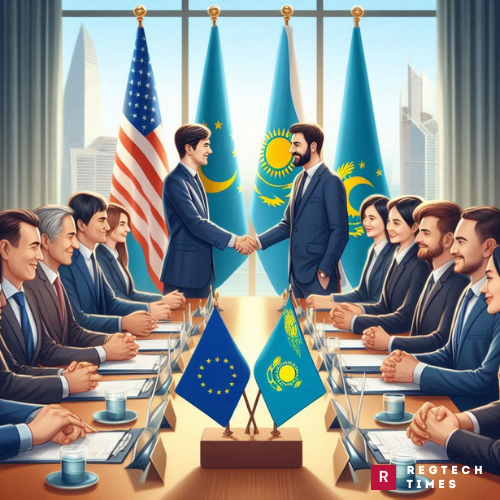The EU-Kazakhstan relationship has evolved significantly in recent years, marked by cooperative efforts in economic integration, sanctions compliance, and strategic diplomacy. As EU Sanctions Envoy David O’Sullivan recently concluded his third visit to Kazakhstan, the discussions and outcomes highlighted mutual commitments and the positive trajectory of EU-Kazakhstan relations.
EU-Kazakhstan Relations: Sanctions Compliance and Diplomatic Efforts
Central to recent engagements between the EU and Kazakhstan is the issue of EU-Kazakhstan relations and sanctions compliance, particularly concerning Russia. The EU has consistently praised Kazakhstan for its efforts to decrease the import and re-export of dual-use sanctioned items to Russia. This collaborative stance aligns with EU sanctions aimed at preventing the proliferation of technologies used in military applications, thereby supporting international efforts for peace and stability.
During his visit, O’Sullivan highlighted Kazakhstan’s proactive measures and cooperation in enforcing these sanctions. He emphasized that while the EU respects Kazakhstan’s sovereign decisions regarding alignment with sanctions, it also appreciates Kazakhstan’s commitment to prevent its territory from being used as a platform for circumventing international sanctions frameworks.
Economic Integration and Trade Dynamics
Economically, Kazakhstan holds strategic importance for EU-Kazakhstan relations as its largest trading partner in Central Asia. The bilateral trade turnover reached $42.6 billion in 2023, a testament to the robust economic ties between the two entities. The EU also stands as a significant source of foreign direct investment (FDI) in Kazakhstan, surpassing $175 billion in cumulative inflows. This economic relationship highlights mutual benefits in energy cooperation, infrastructure development, and technological exchange.
Of particular note is the role of Kazakhstan as a vital supplier of oil to the EU via the Caspian Pipeline Consortium (CPC). Recent developments have seen collaborative efforts to enhance operational efficiency, ensuring smooth energy flows that contribute to Europe’s energy security objectives.
Strategic Partnership and Diplomatic Initiatives
Beyond economic interests, Kazakhstan and the EU are actively engaged in strengthening their strategic partnership. Discussions during O’Sullivan’s visit included commitments outlined in the Enhanced Partnership and Cooperation Agreement (EPCA), aimed at deepening political dialogue and fostering cooperation across various sectors.
Diplomatic initiatives have also included easing visa procedures for Kazakh citizens traveling to the EU. Plans to negotiate a visa facilitation agreement reflect mutual aspirations to enhance people-to-people exchanges, further cementing cultural and social ties between Kazakhstan and EU member states.
Challenges and Future Directions in EU-Kazakhstan Relations
While the relationship between Kazakhstan and the EU shows positive momentum, challenges persist, particularly in navigating geopolitical complexities and economic fluctuations. Ongoing dialogue and cooperation will be crucial in addressing these challenges effectively and ensuring sustained growth and stability in EU-Kazakhstan relations.
Geopolitically, Kazakhstan’s strategic position in Central Asia positions it as a crucial contributor to regional stability and security. The EU appreciates Kazakhstan’s constructive contributions to fostering peace and cooperation in the region, thereby enhancing broader stability across Eurasia.
Economically, Kazakhstan and the EU are actively seeking to enhance collaboration in innovation and the transfer of technology. Initiatives aimed at boosting digital connectivity and sustainable development are areas of mutual interest, aligning with global trends towards green energy and digital transformation.
Conclusion
The evolving EU-Kazakhstan partnership exemplifies a dynamic blend of economic integration, diplomatic cooperation, and mutual respect for international norms. As both entities continue to navigate global challenges, their collaborative efforts in sanctions compliance, economic development, and strategic diplomacy serve as a model for constructive international relations. With a foundation built on shared values and common goals, Kazakhstan and the EU are poised to deepen their alliance, contributing to prosperity and stability in Eurasia and beyond.
In summary, the EU-Kazakhstan relationship is characterized by growing economic ties, diplomatic collaboration, and shared strategic interests. By leveraging these strengths and addressing challenges proactively, Kazakhstan and the EU can further enhance their partnership and contribute to regional and global stability.


